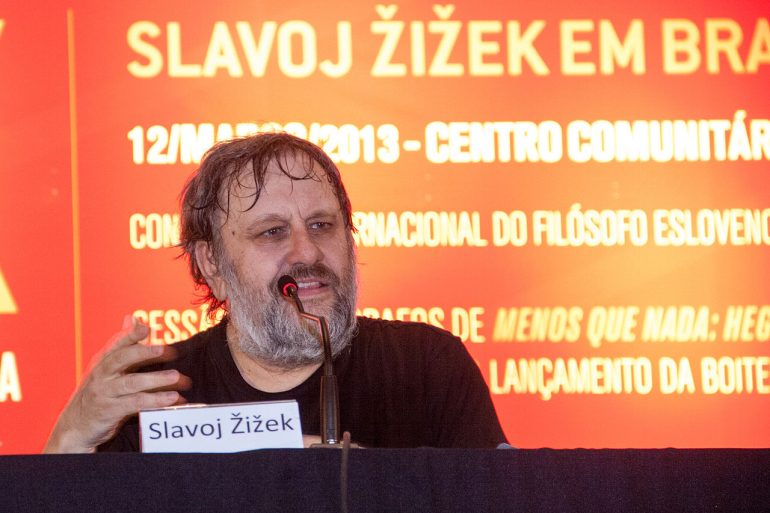Though Slovenian philosopher Slavoj Zizek begins his Independent op-ed by asserting that he “rejects antisemitism”, the very strapline,”Today, the charge of antisemitism is addressed at anyone who critiques Israeli policy”, evokes a common trope used by anti-Semites: the charge that Jews dishonestly cry antisemitism to stifle criticism of Israel (known as the Livingstone Formulation).
In the same paragraph of the op-ed (“There is no conflict between the struggle against antisemitism and the struggle against Israeli occupation”, Dec. 4), he makes another supremely dishonest argument.
I, of course, indisputably reject antisemitism in all its forms, including the idea that one can sometimes ”understand” it, as in: “considering what Israel is doing on the West Bank, one shouldn’t be surprised if this gives birth to antisemitic reactions”. More precisely, I reject the two symmetrical versions of this last argument: “we should understand occasional Palestinian antisemitism since they suffer a lot” as well as “we should understand aggressive Zionism in view of the Holocaust.”
First, this is a classic straw man argument, as next to nobody has excused “agressive Zionism” (whatever that means) by citing Jewish suffering during the Holocaust. Also, the juxtaposition of the two arguments, that ‘Palestinian antisemitism could be excused because of Palestinian suffering’, and ‘Zionism should be excused because of the Holocaust’, arguably suggests that Zionism (like antisemitism) can be seen as a form of racism.
Then, repeating the charge that antisemitism is often invoked to discredit a totally justified critique of Israeli politics”, Zizek makes an even more dishonest charge:
More and more, mere sympathy for the Palestinian resistance is condemned as antisemitic. Take the two-state solution: while decades ago it was the standard international position, it is more and more proclaimed a threat to Israel’s existence and thus antisemitic.
The suggestion that anyone has been accused of antisemitism for supporting the two-state solution is absurd, as the overwhelming majority of the Jewish community (and a plurality of Israelis) supports two-states.
Zizek then suggests that “Zionism” (or Zionists) use antisemitic logic when defending Israel:
Things get really ominous when Zionism itself evokes the traditional antisemitic cliché of roots. Alain Finkielkraut wrote in 2015 in a letter to Le Monde: “The Jews, they have today chosen the path of rooting.”
…
The irony is that we are dealing here with a weird attempt to mobilise antisemitic clichés in order to legitimize Zionism: antisemitism reproaches the Jews for being rootless; Zionism tries to correct this failure by belatedly providing Jews with roots.
Like so much of Zizek’s writing, his prose here is confusing and contradictory. If anti-Semites have traditionally referred to Jews as “rootless”, then how can it be argued that Zionists evoke that same antisemitic rhetorical trope when speaking of their historical roots in the land of Israel?
However, Zizek, who’s previously expressed his support for a one-state solution, uses this convoluted logic to advance another calumny – that Jews don’t in fact have “roots” in the land.
However, the trouble with Jews today is that they are now trying to get roots in a place which was for thousands of years inhabited by other people.
In addition to the insidious “trouble with Jews today” line, the claim is grotesquely misleading, as Jews’ uninterrupted presence in the land “for thousands of years” is a historical fact, not Zionist propaganda. He also seems to be accepting the ahistorical claims by Palestinians that they were the original inhabitants.
Zizek then revisits and further expounds upon his previous canard: that Jews and/or Israelis cynically use the charge of antisemitism, and memories of the Holocaust, to silence legitimate criticism of Israel:
Today, the charge of antisemitism is more and more addressed at anyone who deviates from the acceptable left-liberal establishment towards a more radical left–can one imagine a more repellent and cynical manipulation of the Holocaust? When protests against the Israel Defense Forces’ activities in the West Bank are denounced as an expression of antisemitism, and (implicitly, at least) put in the same line as Holocaust deniers–that is to say, when the shadow of the Holocaust is permanently evoked in order to neutralise any criticism of Israeli military and political operations–it is not enough to insist on the difference between antisemitism and the critique of particular measures of the State of Israel. One should go a step further and claim that it is the State of Israel that, in this case, is desecrating the memory of Holocaust victims, ruthlessly using them as an instrument to legitimise present political measures.
The truth is that the only time that anti-Israel demonstrators are accused of antisemitism is when they espouse antisemitic tropes (per the IHRA definition), or threaten Jews with violence, in the service of their cause.
Yesterday on the streets of London anti-Israel protesters screamed these death threats at Jews in Arabic:
You dog only death will come to you
You son of a b*stard only death will come to you
You Zionist only death will come to you pic.twitter.com/sEC6oEPvUU— Israel Advocacy Movement (@israel_advocacy) November 17, 2019
The writings of Slavoj Žižek, an admirer of Lenin and foe of liberal democracy who who attributed the attacks of 9/11 to the “antagonisms of global capitalism”, have all the markings of a socialist revolutionary intellectual trying desperately to stay relevant in an age which has rejected such historically lethal ideologies.
Unsurprisingly, the Corbyn-Milne brand of neo-Marxist politics he embraces also seems intent on at least trying to hide one central component of his core beliefs – an innate hostility to Jews and Israel.
Related Articles
- The Deadly Jester (A review of Zizek’s book at The New Republic)





